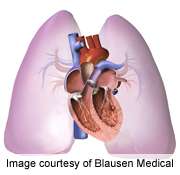For patients with pulmonary arterial hypertension, the new dual endothelin-receptor antagonist macitentan is associated with reductions in morbidity and mortality, according to a study published in the Aug. 29 issue of the New England Journal of Medicine.
(HealthDay)—For patients with pulmonary arterial hypertension, the new dual endothelin-receptor antagonist macitentan is associated with reductions in morbidity and mortality, according to a study published in the Aug. 29 issue of the New England Journal of Medicine.
Tomás Pulido, M.D., from the Ignacio Chávez National Heart Institute in Mexico City, and colleagues assessed the efficacy of macitentan for patients with symptomatic pulmonary arterial hypertension. Participants were randomized to receive placebo (250 patients), 3-mg macitentan once-daily (250 patients), and 10-mg macitentan once daily (242 patients). The primary end point was the time from treatment initiation to first occurrence of a composite of death, atrial septostomy, lung transplantation, initiation of treatment with intravenous or subcutaneous prostanoids, or pulmonary arterial hypertension worsening.
The researchers found that the primary end point occurred in 46.4, 38.0, and 31.4 percent of patients in the placebo, 3-mg, and 10-mg groups, respectively. Compared with placebo, the hazard ratios for the 3-mg and 10-mg macitentan doses were 0.70 and 055, respectively. The most frequent primary end point event was worsening of pulmonary arterial hypertension. The impact of macitentan on this end point was seen regardless of baseline pulmonary arterial hypertension therapy. Headache, nasopharyngitis, and anemia were the most frequent adverse events associated with macitentan.
"In conclusion, macitentan significantly reduced morbidity and mortality among patients with pulmonary arterial hypertension," the authors write.
The study was funded by Actelion Pharmaceuticals, the manufacturer of macitentan.
More information: Full Text (subscription or payment may be required)
Journal information: New England Journal of Medicine
Copyright © 2013 HealthDay. All rights reserved.





















